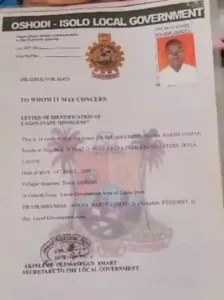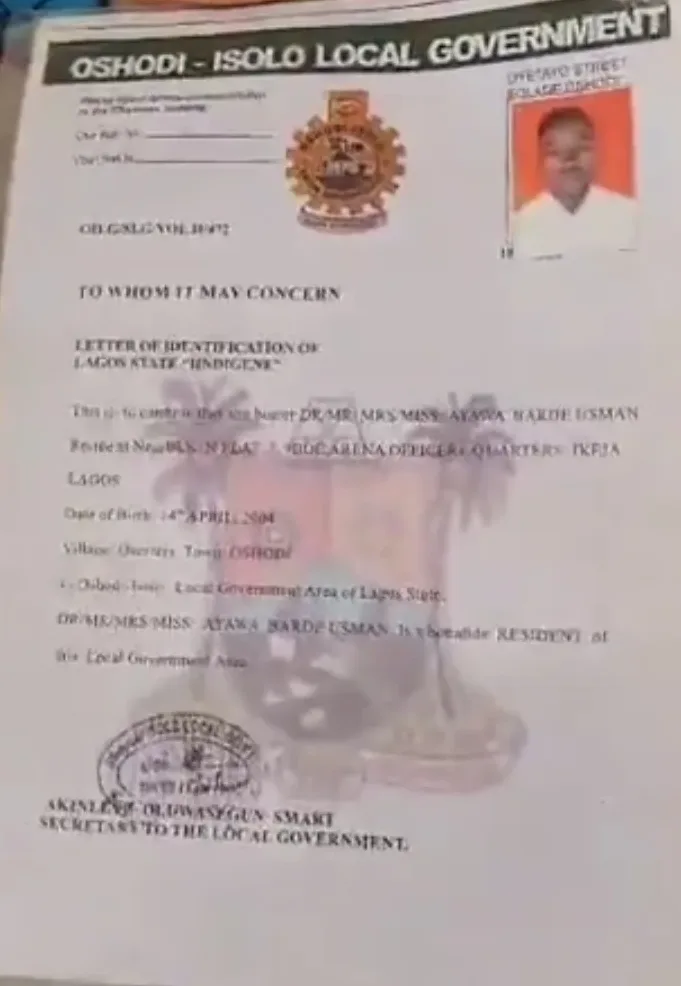In a curious turn of events, a video circulating on social media has stirred controversy as individuals claiming Kaduna origin proudly paraded themselves as Lagosians during a Nigerian Army training exercise.
The gist of the matter lies in the certificates of origin they displayed, as they belong to Kosofe L.G A, Lagos Island LGA and Oshodi/Isolo LGA in Lagos state.
While the concept of individuals from one state representing another in official capacities may seem anomalous, it’s important to recognize that Nigerian citizens enjoy full rights as long as they are born and raised in a particular location and actively contribute to its growth.
In this case, the legitimacy of their claims hinges on whether these individuals possess authentic documents or have made fraudulent assertions about their residency in Lagos.
The primary concern arises from the origin of the certificates displayed by the individuals. In the video, the interviewer sought clarification on the source of these indigenous certificates, but the six individuals had no explanation. It becomes evident that the certificates were not issued by the local government, raising suspicions of potential forgery.
It is worth noting that obtaining local government certificates of origin in Lagos, or any other state for that matter, is not a big deal as there are many certificate vendors online that can easily get you any certificate of your choice with a certain amount.
The issue surfaces when the authenticity of these certificates is questionable. As revealed by sources, fake certificates of origin can be procured, creating a weakness that individuals may exploit for various reasons.
The question arises is that: If an “Aboki,” is born in Lagos with a legitimate birth certificate, what restriction exists to not consider them a Lagosian? This raises broader discussions about the inclusivity of residency definitions and challenges the traditional notions of identity based solely on place of birth.

Amid this confusing situation, it becomes crucial to investigate the authenticity of the certificates and discern whether these individuals genuinely meet the criteria to proudly call themselves Lagosians.
Furthermore, another video circulated and obtained by Idan News early hours of Thursday, showed the victims confessed to having acquired the indigenous certificate of Lagos State from a cafe whose name and location are yet to be revealed.
Idan News gathered that some vendors issue Birth Certificate and state of Origin Certificates ranging from N15,000 to N25,000.
The range includes:
BIRTH CERTIFICATE
1 year – 16 years – N15K
17year- 35years- N17K
36years upwards – N20K
STATE OF ORIGIN CERTIFICATE
Lagos- N15K
Ogun, Oyo, Ekiti, Ondo, Edo – N20K
Kwara, Osun- N25K
Meanwhile, what should be noted in the first Video circulated on Wednesdays was that the six of them were from Kano State and three of them claimed to have been staying with their uncle in Lagos barracks.
The unfolding events prompt a reevaluation of existing systems and an exploration of ways to prevent the misuse or fabrication of documents that contribute to identity and citizenship claims.
As the controversy surrounding the Kaduna individuals representing Lagos deepens, it underscores broader issues related to identity, documentation, and the complexities of defining citizenship in a diverse nation like Nigeria.
The lack of transparency regarding the source of the certificates of origin raises questions not only about the specific individuals involved but also about the potential vulnerabilities within the system.
As these certificates are proven to be fake, they expose a gap in the verification processes for such crucial documents.

The reactions to this video have been diverse, with some advocating for stricter measures to verify documentation. This scenario prompts a larger conversation about the need for a nuanced
and adaptive approach to citizenship and identity in Nigeria.
Additionally, it highlights the significance of accountability in the issuance of official documents. If individuals can easily obtain fraudulent certificates, it not only jeopardizes the integrity of the system but also compromises the trust citizens place in the validity of such documents.
The Kaduna to Lagos identity saga serves as an example of broader challenges facing the nation. It calls for a thorough investigation into the authenticity of documents, a reassessment of citizenship criteria, and a reflection on the efficacy of current systems in ensuring transparency and integrity. Ultimately, it provides an opportunity for Nigeria to evolve its approaches to identity, citizenship, and documentation in a way that aligns with the realities of a complex and interconnected society.

